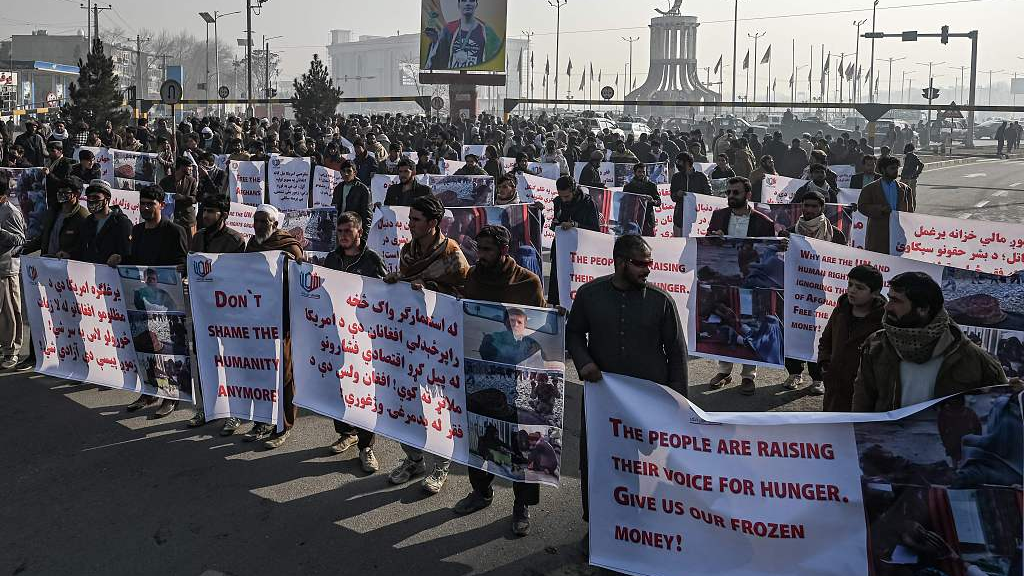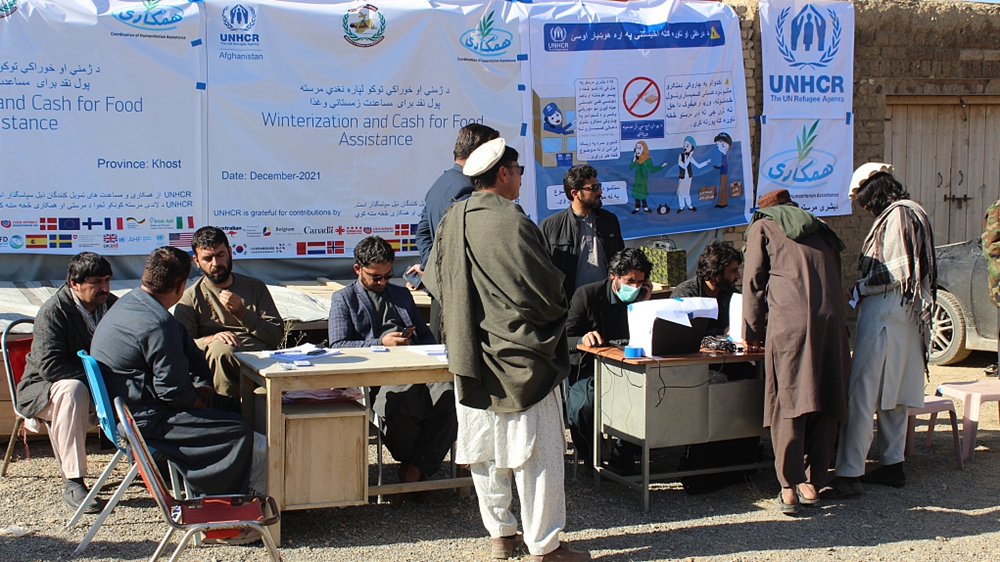
A protest demanding the release of Afghanistan's frozen assets, in Kabul, Afghanistan, December 21, 2021. /CFP
A protest demanding the release of Afghanistan's frozen assets, in Kabul, Afghanistan, December 21, 2021. /CFP
Editor's note: Bradley Blankenship is a Prague-based American journalist, political analyst and freelance reporter. The article reflects the author's opinions and not necessarily the views of CGTN.
A particularly damning dispatch was published on March 17 by New York-based Human Rights Watch (HRW) about the hunger crisis in Afghanistan. The report notes in its sub-heading: "Without A Functioning Central Bank, Aid Not Enough."
To begin, there were some particularly horrific numbers in the report. It notes that since January this year, roughly 13,000 Afghan newborns have died from malnutrition and hunger-related diseases.
According to statistics by the United Nations Office for the Coordination of Humanitarian Affairs, an estimated two babies per minute were born in Afghanistan between August 15, 2021, when the Taliban took control of the country, and November 23 the same year.
Assuming this number hasn't changed too much, some back-of-the-envelope math shows that this means about 1 in 10 Afghan newborns is in danger of dying from hunger, and this figure is likely to worsen.
Meanwhile, 95 percent of the entire population doesn't have enough to eat and an estimated 3.5 million children need nutritional support. These figures are horrifying and, as the HRW report notes, a direct result of the country not having a functioning banking system.
However, the report falls short of clearly pointing fingers in this situation, which is expected since HRW is most of the time just a tool for U.S. government propaganda. But we all know the culprit: Washington. It does, however, note that it's even difficult if not impossible to send aid to Afghanistan because banks are afraid of initiating transactions in fear of exposure to sanctions.
But, again, the country imposing those sanctions is the United States. The ongoing tragedy that is Afghanistan's hunger crisis is neither a natural disaster nor some kind of collective humanitarian failure; it is a clear and unequivocal moral failure of the U.S. government.
With a stroke of a pen, U.S. President Joe Biden could easily ameliorate the suffering of millions of people, including innocent children. That he is not doing that, plus stealing the country's central bank assets parked in the U.S., is a despicable crime against humanity.
While the exact numbers and anecdotes in this report were indeed shocking, it is not a total surprise. People had been sounding the alarm for months about the potential for starvation in Afghanistan after U.S.-imposed sanctions and the seizure of the Afghan Central Bank's assets. It underscores, again, just how deliberate Washington's actions are.

People wait as UNHCR distributes cash to families of refugees from Waziristan in Gulan camp, Khost Province, Afghanistan, December 9, 2021. /CFP
People wait as UNHCR distributes cash to families of refugees from Waziristan in Gulan camp, Khost Province, Afghanistan, December 9, 2021. /CFP
It is exactly this consequence that underscores why the overwhelming majority of the international community – that is, countries in the world and not just a bloc of wealthy countries – is opposed to unilateral sanctions.
Washington insists that its sanctions are meant to target a country's leadership to get them to change their behavior. In the context of Afghanistan, Washington says it does not want to legitimize the Taliban's leadership, which could include the degradation of civil liberties and attacks on the rights of women and girls.
It sounds nice in principle, but the frivolity with which sanctions are imposed on entire populations means that their effects are necessarily felt on everyone. In fact, when the United States began these practices, top officials admitted they were intended to usher in their wholesale destabilization of civil society with the intent to overthrow governments.
Sometimes this works, but most of the time it doesn't. For example, the United States has had Cuba under an embargo for 60 years, and still, Cuba has remained independent. The U.S. has also kept countries like the Democratic People's Republic of Korea, Iran, Venezuela, Nicaragua and Syria under full-spectrum sanctions without successful regime change – only needless human suffering.
Now, as the U.S. tries to do the same to Russia, an important country politically and a sizable economy, we can see that a vast majority of the world is not joining in. It's true that a UN General Assembly Resolution was passed with wide majority support by UN member states to denounce Russia's "special military operation" in Ukraine, but only a few dozen rich countries have imposed sanctions on Russia over it.
That's because the sanctions, while billed as discouraging Russia's operation, will very clearly hurt average Russians and sow destitution. Especially given Russia's importance in fields like energy and agriculture, this would also mean that those sanctions would reverberate to the general population around the globe. The rich countries on board with these sanctions are already experiencing this, to be sure, but developing can't and don't want to risk it.
Time and time again, unilateral sanctions show themselves to be anything but humanitarian. They are, in fact, the complete opposite. The effects of U.S. sanctions on Afghanistan are a prime example of the degree to which they are a horrific crime against humanity – and underscore why the developing world is not supporting them now against Russia or anyone else.
(If you want to contribute and have specific expertise, please contact us at opinions@cgtn.com. Follow @thouse_opinions on Twitter to discover the latest commentaries on CGTN Opinion Section.)

